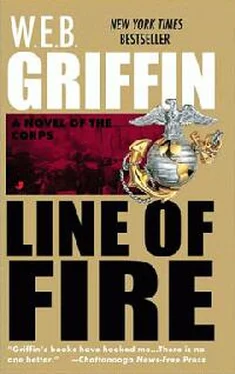W.E.B. Griffin - The Corps V - Line of Fire
Здесь есть возможность читать онлайн «W.E.B. Griffin - The Corps V - Line of Fire» весь текст электронной книги совершенно бесплатно (целиком полную версию без сокращений). В некоторых случаях можно слушать аудио, скачать через торрент в формате fb2 и присутствует краткое содержание. Жанр: prose_military, на английском языке. Описание произведения, (предисловие) а так же отзывы посетителей доступны на портале библиотеки ЛибКат.
- Название:The Corps V - Line of Fire
- Автор:
- Жанр:
- Год:неизвестен
- ISBN:нет данных
- Рейтинг книги:4 / 5. Голосов: 1
-
Избранное:Добавить в избранное
- Отзывы:
-
Ваша оценка:
- 80
- 1
- 2
- 3
- 4
- 5
The Corps V - Line of Fire: краткое содержание, описание и аннотация
Предлагаем к чтению аннотацию, описание, краткое содержание или предисловие (зависит от того, что написал сам автор книги «The Corps V - Line of Fire»). Если вы не нашли необходимую информацию о книге — напишите в комментариях, мы постараемся отыскать её.
The Corps V - Line of Fire — читать онлайн бесплатно полную книгу (весь текст) целиком
Ниже представлен текст книги, разбитый по страницам. Система сохранения места последней прочитанной страницы, позволяет с удобством читать онлайн бесплатно книгу «The Corps V - Line of Fire», без необходимости каждый раз заново искать на чём Вы остановились. Поставьте закладку, и сможете в любой момент перейти на страницу, на которой закончили чтение.
Интервал:
Закладка:
Two sailors in undress white uniforms stood at either side of the gangplank at parade rest.
Join the Navy and see the Potomac, Pickering thought cynically and then was immediately ashamed of the cynicism.
The sailors came to attention as he started onto the gangplank.
"Good evening," Pickering said and smiled at them.
A full Lieutenant and two more sailors stood on the deck at the end of the gangplank.
At the last moment Pickering remembered his Naval courtesy, and that the Potomac was legally a ship of the line.
"Permission to come aboard, Sir," he asked.
"Granted." Pickering saluted the National Colors and then the officer of the deck.
"The President asks that you join him on the fantail, Sir," the officer of the deck said, and gestured toward the stern of the ship.
Canvas had been hung from the overhead to the rail along the dock side of the Potomac, obviously to shield the vessel from the eyes of the curious. But when he reached the fantail, he saw the river side was open. Or at least only covered by mosquito netting.
The President was sitting in an upholstered wicker chair, facing away from the wharf.
What the hell is the protocol? Do I just walk in and say hello?
There was another Naval officer on the fantail, wearing a somewhat wilted white uniform, with four stars on each shoulder board, the insignia of a full admiral.
Admiral William D. Leahy, Chief of Staff to the President, was sitting on a wicker couch and holding a glass of what looked like iced coffee.
He looks, Pickering thought, a good deal older than the last time I saw him.
He then remembered hearing somewhere that while Leahy had been Ambassador to Vichy France, his wife had suddenly taken ill and died. It was said that Leahy had taken it badly.
That probably explains why he looks so old, Pickering thought. Then he wondered, What the hell am I supposed to do?
Salute him? Jesus Christ, what am I doing in the Navy?
Franklin Delano Roosevelt solved Pickering's dilemma. He looked over his shoulder, saw him, and smiled.
"Fleming, my dear fellow!" he said. "How good to see you! Come in and sit down by me."
"Good evening, Mr. President," Pickering said. Something was tugging at his hat. He had without thinking about it tucked it under the cast on his left arm. He looked and saw a white-jacketed Navy steward smiling at him.
"Let me have that, please, Sir." Pickering raised his arm, and the uniform cap disappeared.
He then walked across the deck to Roosevelt.
Roosevelt offered his hand. The grip was surprisingly strong.
"Good evening, Mr. President," Pickering repeated.
Jesus, he does get to me. I already said that.
"I believe you know Bill Leahy, don't you, Fleming?"
"I have had that privilege," Pickering said. "Good evening, Admiral."
"Pickering," Leahy said.
"Sit down and tell me your pleasure," Roosevelt said. "Does your medical condition permit alcohol?"
"It demands it, Sir," Pickering said.
The steward who had snatched his cap was back at his side.
"What may I get you, Sir?"
"Scotch, please. Water. Not much ice."
"And there is my favorite Republican," Roosevelt said, beaming at Senator Fowler. "Richmond, it's good to see you."
"Mr. President," Fowler said formally, making a nod that could have been a bow.
While Pickering was lowering himself into the wicker chair beside Roosevelt, he felt the Potomac shudder as the propellers were engaged.
Christ, they were waiting for us to get under way!
"How are you, Admiral?" Fowler asked.
"Very well, thank you, Senator."
"Richmond," the President said, "could I ask you to excuse us a moment?
There's a little business I'd like to get out of the way, before we..
"Of course, Mr. President," Fowler said.
One of the stewards held open for Fowler a sliding glass door to an aft cabin and then stepped inside after him. A second steward put a glass in Pickering's hand and then followed the first into the aft cabin.
"I'd like you to do something for me, Fleming," Roosevelt said, laying a hand on Pickering's arm.
"I'm at your command, Sir."
"But there are a few matters I'd like to get straight, if you will," Roosevelt said, "about your previous contributions to the war effort."
"Of course, Mr. President."
"I understand that you met with Bill Donovan right after the war started, isn't that so?"
"Yes, Sir, it is." William S. Donovan, a New York lawyer, had been asked by Roosevelt to establish an organization to coordinate all United States intelligence activities (except counter intelligence, which was handled in the U.S. and Latin America by J. Edgar Hoover's FBI. The organization evolved first into the Office of Strategic Services (OSS) and ultimately into the Central Intelligence Agency (CIA).
"I understand that your talk with Donovan didn't go well,"
"That's correct, Sir." Where the hell did he hear that? Did Donovan fell him? Or Richmond Fowler?
Roosevelt laughed.
"Forgive me. But you and Bill are the immovable object and the irresistible force. I'm really not at all surprised. I would love to have been a fly on the wall."
"Actually, Sir, it was quite civil. He asked me to become sort of a clerk to a banker whom I knew, and I respectfully declined the honor." Pickering sensed Leahy's eyes on him, glanced at him, and was surprised to see what could have been a smile on his lips and in his eyes.
"And then, as I understand it," Roosevelt went on, "when you went to The Marines and offered your services, they respectfully declined the honor?"
"They led me to believe, Mr. President," Pickering replied, smiling back at Roosevelt, who was quietly beaming at his play on words, "that as desperate as they were for manpower, there was really no place in The Corps for a forty-six-year-old corporal. "
"And then you went to Frank Knox, and he arranged for you to be commissioned into the Navy?" That wasn't the way it happened. Frank Knox came to me and asked me to accept the commission.
"Yes, Sir," Pickering said.
`Admiral Leahy and I have just about concluded that was a mistake," Roosevelt said.
"So have I, Mr. President. I-"
"I don't think the President means to suggest that you're not qualified to be a Naval captain, Captain," Leahy broke in quickly. "I certainly don't. Your conduct aboard the Gregory put to rest any doubts about your competence. And I was one of those who never had any doubts."
"I didn't mean that the way it sounded, Fleming," Roosevelt said.
"I respectfully disagree, Admiral," Pickering said. "I should not be a Naval officer, period."
"Now with that, " Roosevelt said, "I agree."
"As soon as I can discuss the matter with Secretary Knox, Mr. President, I intend to ask him to let me out of the Service."
"I know," Roosevelt said. "He told me. I'm afraid that's quite impossible, Fleming. Out of the question."
"I don't quite understand," Pickering said.
`You're familiar, of course, with the Office of Management Analysis in Headquarters, U.S. Marine Corps?"
Pickering thought a moment, came up with nothing, and replied, "No, Sir. I am not."
"Does the name Rickabee mean anything to you, Pickering." Leahy asked.
"Yes," Pickering replied immediately. "Yes, indeed. Outstanding man."
"He heads the Office of Management Analysis," Roosevelt said a trifle smugly.
"Yes, Sir," Pickering said, feeling quite stupid. He had never actually met Lieutenant Colonel F. L. Rickabee, USMC, but he had seen how efficiently the man could operate. He had, in fact, vowed to find Rickabee in Washington, to shake his hand, and say thank you.
Among the long list of Navy brass actions in the Pacific that were outrageously stupid in Fleming Pickering's view was their handling of the Royal Australian Navy Coastwatcher Establishment.
Читать дальшеИнтервал:
Закладка:
Похожие книги на «The Corps V - Line of Fire»
Представляем Вашему вниманию похожие книги на «The Corps V - Line of Fire» списком для выбора. Мы отобрали схожую по названию и смыслу литературу в надежде предоставить читателям больше вариантов отыскать новые, интересные, ещё непрочитанные произведения.
Обсуждение, отзывы о книге «The Corps V - Line of Fire» и просто собственные мнения читателей. Оставьте ваши комментарии, напишите, что Вы думаете о произведении, его смысле или главных героях. Укажите что конкретно понравилось, а что нет, и почему Вы так считаете.









